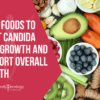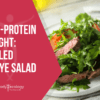Top 3 Ways to Get More Vitamin D
From your bones to your immune system, vitamin D plays an essential role in your overall health.
And according to the Vitamin D Council, we are not getting enough of it.
Extreme vitamin D deficiency can show up as pain or weakness in the bones. This is because vitamin D supports the body’s ability to deposit minerals (like calcium) into the bone. Without enough vitamin D, your bones can become soft, porous, and brittle.
Vitamin D also helps to balance the immune system. In short, it strengthens the arm of the immune system that fights infection. In fact, studies have found that a number of white blood cells—which are a part of your immune system—have receptors for vitamin D. (1) With low levels of vitamin D, you may find that you are susceptible to frequent infections.
But more isn’t necessarily better.
The active form of vitamin D is a hormone in the body. It regulates the serum concentration of minerals like calcium and phosphate.
This means that too much vitamin D can lead to too much calcium in the blood. Over the long term, the body deposits this excess calcium in soft tissue—such as the kidneys, the liver, and the heart.
How to Get the Right Amount of Vitamin D
A vitamin D deficiency can directly affect bone and immune health. If you suffer from frequent infections, spending more time in the sun and enjoying fermented foods can naturally boost levels of vitamin D.
Fortunately, unless you are taking a vitamin D supplement, vitamin D toxicity—or too much vitamin D—is not common.
Vitamin D works in concert with other vitamins and minerals. When you consume foods that are rich in vitamin D, you also consume vitamins and minerals that naturally prevent vitamin D toxicity.
Below are our top 3 ways to optimize levels of vitamin D:
1. Welcome the Sun. Vitamin D3 is a precursor to the active form of vitamin D. The skin makes vitamin D3 when exposed to ultraviolet irradiation (or UV rays). According to some sources, roughly 90% of our vitamin D comes from the skin. (2)
When it comes to synthesizing enough vitamin D to meet your body’s requirements:
- Get into the sun at least 3 times a week, 15-20 minutes at a time.
- Get sun before 11 am or after 4pm, which allows you to catch more of the beneficial light and avoid harmful rays.
2. Enjoy Fermented Foods. A study published this past April in the Journal of Clinical Endocrinology & Metabolism was the first report that a lactobacillus probiotic supplement could significantly increase levels of vitamin D in the blood. (3)
Dr. Jones, lead researcher explains that, “Although it has long been known that the gastrointestinal tract plays an active role in the absorption of vitamin D, these findings showing improved vitamin D status in response to an orally delivered probiotic are a first. [They] will inform the development of new products that may be beneficial for people with low vitamin D levels.”
Fermented foods are the best source of living beneficial bacteria and ensure that probiotics arrive to your gut, healthy and ready to colonize the large intestine. (4)
3. Cod Liver Oil. Early 20th Century researchers found that cod liver oil could help to prevent a once-common childhood disease called Ricketts—a disease caused by vitamin D deficiency that leaves bones soft and weak.
Cod liver oil is a superfood. This means that it naturally contains cofactors that help it to work seamlessly in your body. For example, cod liver oil is rich in vitamin A, which prevents vitamin D toxicity.
Traditionally, cod liver oil was made by filling a wooden barrel with fresh cod livers and seawater. The mixture was allowed to ferment for up to a year before removing the oil. These days, cod liver oil is processed from whole bodies of cod and deodorized—a process that drastically reduces the nutrient profile and vitamin D levels of cod liver oil. Most manufacturers then add these nutrients back into the oil. (5)
What To Remember Most About This Article:
Vitamin D is foundational when it comes to bone and immune health. A vitamin D deficiency can result in pain or weakness in the bones; it can also leave the body susceptible to frequent infection.
Too much vitamin D can mean too much calcium in the blood. But unless you’re taking a supplement, this type of vitamin D toxicity is rare. In most cases, you may be in desperate need of more vitamin D to strengthen your bones and support your immune system.
Here are 3 easy ways to get the right amount of vitamin D:
- Go out into the sun 3 times a week for 15-20 minutes at a time; sun exposure before 11 AM or after 4 PM is recommended.
- Eat more fermented foods to naturally increase levels of vitamin D in the blood.
- Try cod liver oil as a natural vitamin D supplement and superfood all-in-one.
- [product id=”1″]
REFERENCES:
- Liu, P. T., Stenger, S., Li, H., Wenzel, L., Tan, B. H., Krutzik, S. R. & Modlin, R. L. (2006). Toll-like receptor triggering of a vitamin D-mediated human antimicrobial response. Science, 311(5768), 1770-1773.
- Holick MF (March 2006). High prevalence of vitamin D inadequacy and implications for health. Mayo Clin. Proc. 81 (3): 353–73.
- Jones, M. L., Martoni, C. J., & Prakash, S. (2013). Oral supplementation with probiotic L. reuteri NCIMB 30242 increases mean circulating 25-hydroxyvitamin D: a post-hoc analysis of a randomized controlled trial. Journal of Clinical Endocrinology & Metabolism.
- Faye, T., Tamburello, A., Vegarud, G. E., & Skeie, S. (2012). Survival of lactic acid bacteria from fermented milks in an in vitro digestion model exploiting sequential incubation in human gastric and duodenum juice. Journal of dairy science, 95(2), 558-566.
- David Wetzel (28 February 2006). Cod Liver Oil Manufacturing. The Weston A Price Foundation. http://www.westonaprice.org/cod-liver-oil/clo-manufacturing. Retrieved 07-01-13.









